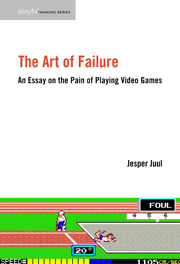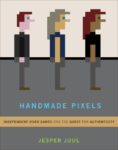There’s a new Humble Bundle with MIT Press Video Game Books, featuring three of my books, many books from our Playful Thinking series, and from Platform Studies.
https://www.humblebundle.com/books/inside-gaming-mit-press-books 


My name is Jesper Juul, and I am a Ludologist [researcher of the design, meaning, culture, and politics of games]. This is my blog on game research and other important things.
There’s a new Humble Bundle with MIT Press Video Game Books, featuring three of my books, many books from our Playful Thinking series, and from Platform Studies.
https://www.humblebundle.com/books/inside-gaming-mit-press-books 


TL;DR; I used to meet resistance to the idea that video game rules (usually expressed in the programming) and algorithms can be meaningful or important. I discuss four ways game rules can create meaning and/or have political implications.
When I first started writing about video games, the humanities (full disclosure: I am a humanities scholar) were probably at the peak of self-importance, and many of the theories we were taught were presented as timeless and universal for explaining all of human culture for all time. It wasn’t really on the table that these theories should be augmented with anything specific going on in, say, video games, or in anything else, new or old.
When I then excitedly tried to argue that the rules of video games could also be central to the game’s attraction and to their meaning, and should be included in the humanities, this came across as boring, nerdy tech stuff that many people couldn’t believe had any importance, and felt about as relevant to them as the construction of printer drivers.

I realized the other day that it’s been years since I had this experience of someone dismissing game rules as irrelevant or meaningless, and I think there is a reason: Our world is now so completely enmeshed in algorithms and in issues of algorithmic bias, that it’s now a given that rules, algorithms, and programming fundamentally matter.
In many ways, of course, but I can see that I have thought mostly about four ways that rules matter.
New and popular culture is often dismissed as “meaningless”, and video games have been dismissed this way along with (say) jazz and romance novels. How then to explain why we find video games meaningful?
A central early and influential example is Gonzalo Frasca’s game September 12th, which at first gives the impression of being a kill-the-terrorists-and-you’re-done game, but once you play, the game reveals how killing breeds resentment and perpetuates a cycle of violence. This made September 12th an influential early example of how the rule system of a game could be expressive, and here express a political point about the counter-productiveness of the War on Terror.
Obviously, most games combine some kind of fictional world with a rule-based system. In the September 12th case, the genre expectations set up by the fiction & visual representation is undercut by the rule system, and we are as players forced to reconsider the actions we are performing in-game. What we think of as meaning is usually a combination of rules, fiction, but also social context, style, and so on.
When I was writing about casual games (A Casual Revolution), it became clear that two of the primary barriers that prevented people for playing video games were:
These were examples of how game rules strongly include or exclude players, depending on their life circumstances, tastes, and video game experience. Design very concretely matters for who is going to play.
I also looked at (The Art of Failure) how failure in a game concretely has implications for our self-image, and how its meaning is tied both to the fictional world, to our identity, and to the social context we are playing in.
This is also where game design observations interface with education. You can design a game, or a test, in ways that encourage or discourage those who fail.
Finally, I think gamification and algorithmic bias overlap. Gamification sets up measures for what we are supposed to do – such as approve the most loans, pass the most students, publish the most papers, be most active on social media. In all cases, what is measured and rewarded is usually not quite what we actually think of as valuable. Publishing more papers is not actually valuable, but we have just set up incentive structures that reward it, and punish those who work for a long time on one paper.
As the gamification term suggests, I suppose, these are typical game design decisions, where we set up rule systems that reward – or punish – certain behaviors.
This problem overlaps quite closely with algorithmic bias: By now, we all have firsthand experience with how algorithms select which posts to feature in newsfeeds, and I think most people understand that AI technologies are both invisible to us, often promoted as objective by companies, while in fact of course they embody lots of biases (here is a bit of a reading list) in gender, ethnic, racial, and class[i] in health[ii] [iii], image recognition[iv], loan approvals[v], policing[vi], to give some examples.
This not to say that video game studies invented the study of algorithms, but the study of games helped bring this hitherto technical domain to the humanities, and it is much easier to discuss game rules now that public discourse so often touches on algorithms.
To sum up, we can think about how the (political) meaning of video games can arise in many different ways, and we can think about this works slightly differently for rules and for fiction (narrative):
Rules interface with the world literally: what happens in a game really does happen. If you lose a game, or if the rule structures makes a game inaccessible to a large portion of the population because it is too difficult, requires too much time, or makes too many assumptions about the audience, that really does happen.
Fiction (~narrative) interfaces with the world metaphorically: what happens in a fiction does not actually happen. This does not make it less culturally important; it just means that we (often) see fiction and narratives as questions of representation and values.
For your theoretical traversal: Transactions of the Digital Games Research Association (ToDiGRA) special issue on “Teaching Games: Pedagogical Approaches”
|
Clara Fernández-Vara
|
|
Jeff Watson
|
|
Mirjam Palosaari Eladhari, Hartmut Koenitz
|
|
Christoffer Mitch C. Cerda
|
|
Hartmut Koenitz, Mirjam Palosaari Eladhari
|
|
Seth Andrew Hudson
|
|
Hartmut Koenitz, Christian Roth, Teun Dubbelman
|
|
René Glas, Jasper van Vught, Stefan Werning
|
I have a new paper out, just presented at the CHI Play’21 conference:
“The Game of Video Game Objects: A Minimal Theory of When We See Pixels as Objects Rather than Pictures.” In Extended Abstracts of the 2021 Annual Symposium on Computer-Human Interaction in Play. CHI PLAY ’21. https://www.jesperjuul.net/text/gameofobjects/
 We’ve discussed immersion (for and against), but I argue that we’ve overlooked a much more fundamental question: Why and when do we think of pixels on the screen as objects, rather than as pictures of objects?
We’ve discussed immersion (for and against), but I argue that we’ve overlooked a much more fundamental question: Why and when do we think of pixels on the screen as objects, rather than as pictures of objects?
During the pandemic, I built a game for exploring this question and wrote an accompanying essay. This extends my previous paper Virtual Reality: Fictional all the Way Down (and that’s OK).
The game presents a series of game objects, and asks the player to consider their status:
The conclusion is not just that games and VR are cultural forms (obviously), but that we judge game objects based on what we are trying to use them for, and game worlds are always designed for particular kinds of uses. And we know this. There thus can be no universal metaverse, only different worlds built for different purposes.
From the abstract:
“While looking to the future, we have overlooked what is right before us. With new technology, haptics, rendering, virtual reality, we have spent much energy discussing immersion and presence, thinking sometimes about current technology, but often about a hypothetical perfect experience or future perfect technology.
In this, we have forgotten something rather fundamental: How do we in the first place decide to see a group of pixels on a screen as an object to which we have access, rather than as a picture of an object? This paper explores this question through a playable essay. At first, we may think that we will identify anything interactive as an object, but the playable essay demonstrates that this is much more complex and pragmatic, and that this identification has three steps – identifying pixels as an object rather than a picture, reasoning about the object as a specific type of object (such as a ball), and identifying it as a real instance of a type of object (such as a calculator).”
Thanks to IVD at The Royal Danish Academy, Nick Montfort, Stefano Gualeni, Pawel Grabarczyk, Dooley Murphy, and Jan-Noël Thon for comments; to Andrés Cabrero Rodríguez-Estecha for visual design; Stephane Bersot for the calculator asset. The project was made with Unity3D and Low Poly Game Kit by JayAnAm.
|
Jan-Noël Thon
|
1-12
|
|
Leland Masek, Jaakko Stenros
|
13-37
|
|
Bettina Bódi
|
39-61
|
|
Sarah Thorne
|
63-85
|
|
Daniella Gáti
|
87-103
|
|
Stefan Werning, Jasper van Vught
|
105-125
|
|
Kieron Brown
|
127-148
|
|
Hanna Järvenpää
|
149-167
|
|
Alysa Chiara Karels, Teresa de la Hera
|
169-198
|
|
Bobby Schweizer
|
199-218
|
For your theoretical journey: Game Studies, volume 21, issue 2.
A Sense of Fear and Anxiety in Digital Games: An Analysis of Cognitive Stimuli in Slender — The Eight Pages
by Bartosz Dudek
by Matthew Horrigan
Many essays in game studies deploy the concept of liminality. The term has become diluted with use. However, Turner and van Gennep developed liminality together with related concepts that suggest a richer account of play than liminality captures on its own. This essay discusses the role of the liminoid in connecting players with characters.
 I was waiting for the pandemic to blow over before thinking about time management again, but it looks like there will be no simple global endpoint, so here goes. I hope this is useful for other potential writers.
I was waiting for the pandemic to blow over before thinking about time management again, but it looks like there will be no simple global endpoint, so here goes. I hope this is useful for other potential writers.
How long does it take to write a book? I must confess I had no idea, but writing Handmade Pixels took me 1000 hours over the course of 4½ years. I had already written a paper on independent games in 2014, but it wasn’t until August 2015 that I decided to write the book that became Handmade Pixels.
Associate professor jobs like mine with dedicated research time are unfathomably privileged and increasingly scarce, yet even people like me will complain of not having time to do research. I use a time tracker to figure out where my time goes, and this lets me see how much time I spent on this book. It’s not an exact science – sometimes I’d work on something else that drifted into the project, and sometimes I’d be interrupted while working.
Results: I clocked a total of 983 hours which were distributed like this (click to zoom):As you can see, only 2/3 of the time was spent in the earnest book-writing phase – after signing a contract and before publishing. Especially copyediting, proofs, and promotion took much more time than you’d intuitively expect.
To my surprise, most of the time I only just managed to work on the book around 20-30 hours a month. My contract technically says that I can (should/should be able to) research 60 hours per month, but I only exceeded that twice. For most months, there were apparently always enough other things happening for me to spend that much time on the book.
This is also the largest book project I’ve done, and I surely couldn’t have done it without my assistant Dooley Murphy, or without the good support of MIT Press and my editor Doug Sery.
I was positively unsure if I could write this book on my regular work schedule. My first three books were all written on considerable chunks of free time (Half-Real: my PhD, A Casual Revolution: 6 months off, Art of Failure: a 6-month grant), so could I even write a book during my regular schedule of teaching, meeting, supervising, and being the head of an educational program? I also have kids, and my productivity drops vertically if I am sleep-deprived, so working late does not make me more productive.
After a million days of never getting to the research I cared about, I’ve settled on the classic writer routine:
This was the best choice imaginable. Of course, it wasn’t always possible to evade other responsibilities in the morning – there were lots of days where I failed – but it at least felt like a pattern, and let me get a continuity of working on the project almost every workday. I probably did around 10 late nights for the entire project, and none after midnight. Not because I didn’t have to, but simply because staying up late would make me miserable without speeding up the project at all.
Some people have asked me how I find the motivation to not go on social media or do other short-term tasks when I am supposed to write, and I am not always successful at that. I do find it useful though to think very hard about how a given activity makes me feel: if I randomly go on social media or check email, it makes me feel terrible & life feel meaningless, while starting my day with research makes me feel great and my life feel meaningful. (There is a good podcast on thinking about “how does it make you feel“.) It’s a bit like the idea of getting drunk on champagne in the morning – on some level it sounds great, but in practice you know it will feel terrible. So you try to do the thing that will make you feel better.
Writing is often very solitary, so habits are very idiosyncratic. I personally don’t have daily goals like word counts, but I have very long TODO lists, describing things I need to read, games I need to play, screenshots I need to take, interviews I need to edit, paragraphs that need to be linked, arguments that need to be sharpened, and so on. For a writing session, I just want to check off some checkboxes. I keep the list of checked tasks around so I can see my progress. I also make new tasks just to check them.
Is 1000 hours fast or slow? I really have no idea. I am probably somewhere in the middle. I know of writers faster than me, and writers who take more time than I do.
This is what I learned from writing Handmade Pixels. If you want to write, I hope there will be time for you to do so as well.
Yes, Game Studies issue 21/1 is out. The rumors are true, this is the 20th anniversary issue.
Without going overboard reminiscing, I’ll just say I think our major goals were achieved, and that it’s fine how Game Studies is just one journal among many now. I think we helped:
One thing I have learned since is that history is basically a game of telephone, often a heavily mythologized one. Thus I don’t want to overstate our centrality – many people were studying video games and thinking about publication channels back then and before. And to counter the erasure that the game of mythologizing telephone creates, let me just list and thank all the people who were in the original group when I was most involved in the journal: Espen Aarseth, Markku Eskelinen, Marie-Laure Ryan, Susana Tosca, Gonzalo Frasca, Anja Rau, Aki Järvinen, Lisbeth Klastrup, Torill Mortensen, Jill Walker.
******
by Espen Aarseth
This issue of Game Studies marks the 20th anniversary of the journal.[more]
by Marco Caracciolo
This article discusses a recent strand of videogames that foreground disruptive animal characters in an urban environment. I link this “animal mayhem” to recent debates on the nonhuman, showing that videogames like Goat Simulator and Untitled Goose Game (my case studies) evoke the inherent strangeness of human-nonhuman connectedness.[more]
by Filip Jankowski
This article attempts to suggest a revision of the historical aesthetic category frequently called the “French Touch.” The article focuses on games that matched the contestataire moment in the history of France from three development circles (Froggy Software, Cobra Soft and François Coulon), arguing that they escape this traditional categorization.[more]
by Emma Reay
This paper examines representations of children in contemporary video games through content analysis. Using a sample of over 500 games published between 2009 and 2019, it identifies the dominant functions of child characters and documents patterns of representation across genres and over time.[more]
by Martin Ricksand
This article analyzes speedruns, the practice of beating a game as fast as possible. The article applies theories from the philosophy of sport as well as the philosophy of fiction, and outlines a way of how to adjudicate on what strategies may be employed in different kinds of speedruns.[more]
“Actual history doesn’t take place”: Digital Gaming, Accuracy and Authenticityby Eve Stirling, Jamie Wood
This paper examines university students’ perceptions of how playing historical videogames has affected their understanding of the past. It focuses on how active engagement in gameplay affects perceptions of historical time and sense of place, in particular the relative importance of accuracy and authenticity.[more]
by Agata Waszkiewicz, Mateusz Kominiarczuk
The article proposes a model of objective-based reward systems based on Gary Alan Fine’s frame analysis and Jesper Juul’s goal typology. The model reconceptualizes various reward-bound goals commonly encompassed under the categories “quests” and “achievements” in order to show them as non-homogenous and yet not dissimilar.[more]
by Martin Roth
Who Are You? Nintendo’s Game Boy Advance Platform (2020) by Alex Custodio. Cambridge, Massachusetts & London: MIT Press. ISBN: 9780262044394. pp. 280.[more]
by John Sharp
Transnational Play: Piracy, Urban Art, and Mobile Games (2020) by Anne-Marie Schleiner. Baltimore, Maryland: Project MUSE. ISBN: 9789048543946. pp. 182.[more]
It used to be hard to make the argument about rules; it is much easier to explain now, because of our daily exposure to algorithms, and because of the ongoing discussions of the meaning and biases of algorithms. The renewed focus on accessibility also means that game developers take their commitments towards the audience more seriously: Think about a game like Gris where you cannot fail, or Celeste, where players can choose whether the game should be an extremely challenging platform game or a forgiving experience. Today it would be decidedly strange for someone to deny that games rules can create meaning, or to dismiss rules and algorithms as unimportant or without concrete and political implications.
My simple hope, then, is that to continue to study games, including their rule systems, is helpful for expressing ideas, thinking about accessibility, and looking at problems of gamification and algorithmic bias. In short, helpful for building algorithmic literacy, and for understanding our algorithm-driven world.
Some Literature
[i] Sara Wachter-Boettcher, Technically Wrong: Sexist Apps, Biased Algorithms, and Other Threats of Toxic Tech, 1 edition (W. W. Norton & Company, 2018).
[ii] Ziad Obermeyer et al., “Dissecting Racial Bias in an Algorithm Used to Manage the Health of Populations,” Science 366, no. 6464 (October 25, 2019): 447–53, https://doi.org/10.1126/science.aax2342.
[iii] Christina Oxholm et al., “Attitudes of Patients and Health Professionals Regarding Screening Algorithms: Qualitative Study,” JMIR Formative Research 5, no. 8 (August 9, 2021): e17971, https://doi.org/10.2196/17971.
[iv] Carsten Schwemmer et al., “Diagnosing Gender Bias in Image Recognition Systems:,” Socius, November 11, 2020, https://doi.org/10.1177/2378023120967171.
[v] Emmanuel Martinez and Lauren Kirchner, “The Secret Bias Hidden in Mortgage-Approval Algorithms – The Markup,” August 25, 2021, https://themarkup.org/denied/2021/08/25/the-secret-bias-hidden-in-mortgage-approval-algorithms.
[vi] Virginia Eubanks, Automating Inequality: How High-Tech Tools Profile, Police, and Punish the Poor (St. Martin’s Press, 2018).